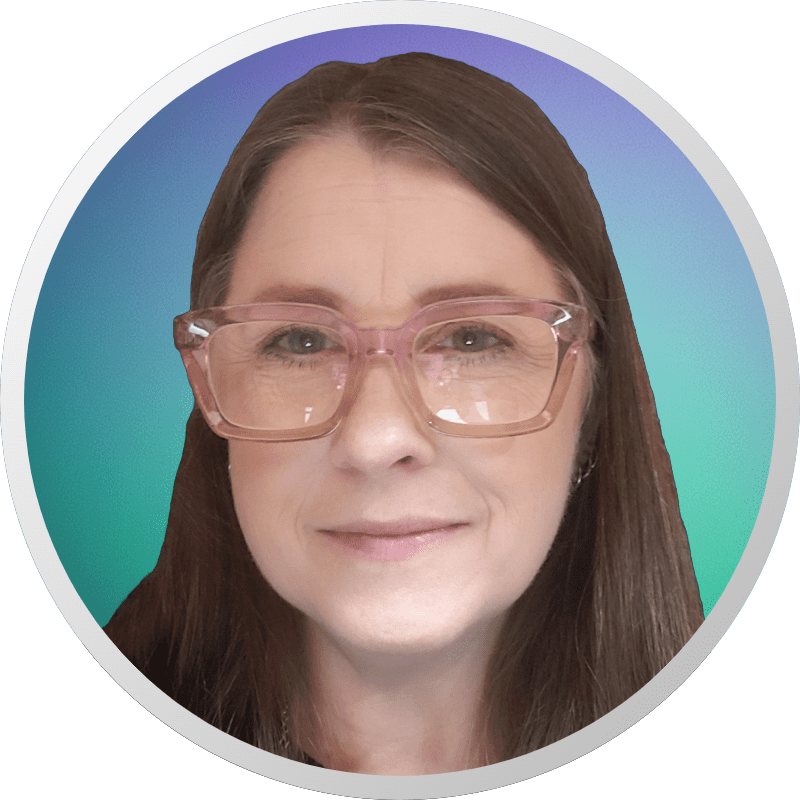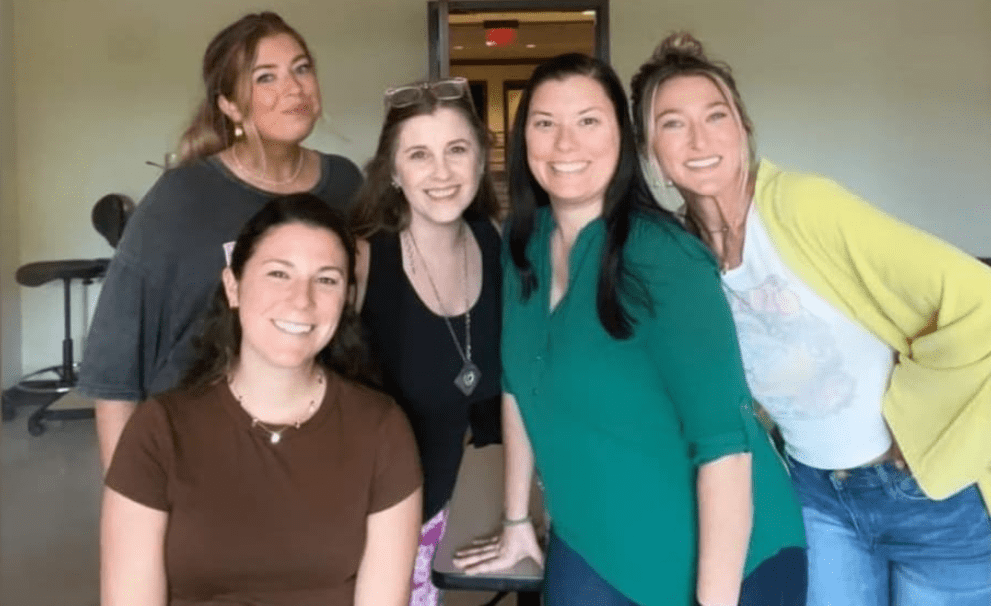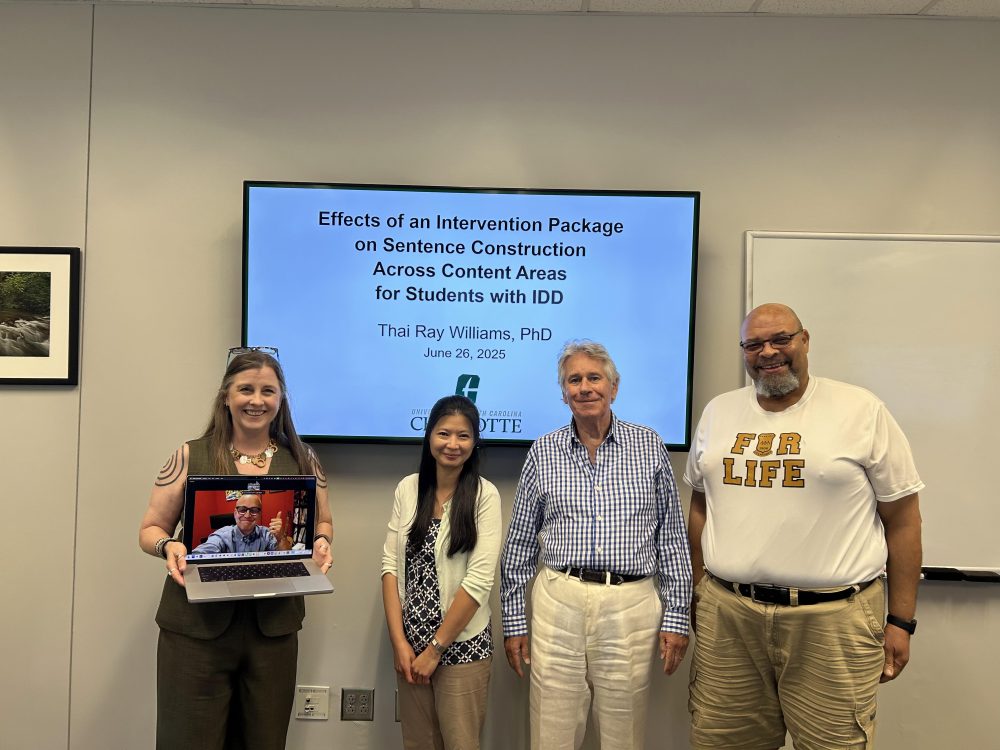A Life of Purpose: Thai Ray Williams, Ph.D. ’25

Thai Ray Williams is not your typical graduate. A 32-year classroom teacher, Williams felt called to do more for her exceptional education students after taking part in Charlotte research. Now, she’s graduating with a Ph.D. in Special Education and is turning over a new leaf as faculty at Utah State University, where she will inspire new teacher candidates to take on careers like hers — either her first in public school classrooms or now, her second as a university professor.
As a special academic curriculum teacher in Charlotte-Mecklenburg Schools, Williams was asked to be an interventionist for research led by previous students in this very Ph.D. program, as she worked with special education students with extensive support needs, a population that’s historically underrepresented in terms of research. This not only showed her what was possible in her field, but also built bridges between her and the department, both students and faculty. “The research that I participated in immediately transferred to my practice as a teacher,” Williams said. “I took the strategies that I learned from their research and embedded them, and then stayed in touch with those people. During COVID, I ended up connecting with one of them in a support group for special education teachers and they suggested that I get a master’s.”
She graduated from East Tennessee State University with an M.Ed. in Advanced Studies in Special Education during the pandemic. “Following graduation, my advisor and thesis chairperson, both UNC Charlotte graduates, told me I should get my doctorate. They said, ‘you’re made for this.’”
And it was a relatively easy yes for her. “What drove me to Charlotte was the support and the camaraderie and how close the department was. I knew that these people loved the program they were in — they voiced that — and they voiced the tremendous amount of support that they got. I knew they were top researchers, the program is highly respected in our field, but the togetherness is what sold it.”

Through the help of some grant funding for a graduate assistantship and a stipend for Ph.D. students in the department, Williams had a seamless transition out of the classroom and into being a doctoral student full-time. “With that, plus the quality of the program, the amount of support, the outcomes of the graduates, and the closeness of the cohort, it was really a win-win all around.”
Special education has always been her passion. Williams can even pinpoint a few key moments where that calling really started to show in her formative years. “I think I’ve always been a caregiver. I was that kid that played teacher all the time in kindergarten, so I think I was a natural teacher… When I was a teenager, there was another child with Down syndrome in my church. I got really close to her family, because I worked in the children’s programs and we connected. And in high school, I was a peer tutor for individuals with intellectual disability, and I was also a member of a student organization, Junior Civinettes, that worked closely with individuals with disabilities. So in my youth, I was surrounded by that work and just really fell in love with it.”
So when she went to College of Charleston for her undergraduate degree, it only made sense to go into education. “I loved teaching already, and it really fed who I was as an individual. It fits my personality, too — I’m a very giving and caring person, but I’m also very comfortable giving a presentation and talking in front of large groups. I think it really afforded me the opportunity to live a life with purpose doing something that, in the end, I absolutely loved. Even now, after completing my Ph.D., I still miss the classroom!”

Williams is already moving forward in a new kind of classroom capacity. Twelve hours after defending her dissertation, she was on a flight to start her contract as a clinical assistant professor at Utah State University, where she will both teach classes to aspiring special educators and continue her research. “I’m in a research position, so it’s 50% research, 40% teaching, and 10% service, so I will be able to continue doing my research in the area of academic instruction, specifically regarding writing for students with extensive support needs.”
Additionally, she has a research interest in the intersection of Indigenous populations and individuals with disabilities that she’ll be able to pursue in Utah. “I’m looking specifically at the intersection of Indigenous pedagogy, evidence-based practices, high-leverage practices, and universal design for learning, and how you would integrate all of those to teach culturally sustaining practices.”
She hopes to work with local tribal educators, since USU has satellite campuses on some of the Native American reservations in the state, and integrate their typical teaching practices with evidence-based practices in the special education field to ultimately help their students with extensive support needs learn things that are important to their community. These aren’t just classroom skills like reading or writing that the typical American education system might find important, but things like oral storytelling, dance, or other tribal customs that individuals with disabilities often get left out of or fall behind in because they don’t learn the way their peers do.
“It feels pretty huge to have a faculty position like this coming straight out of my doctoral program, but again, I’ll say that everything I did in the program perfectly prepared me for this moment and this job. Everything I could have hoped for, my doctoral program at Charlotte fulfilled.”